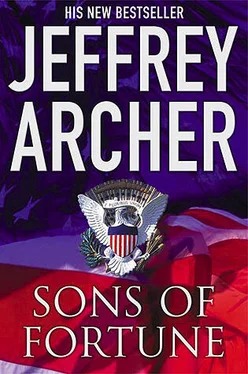‘It only takes about fifteen minutes a day,’ said Nat. ‘I check the Japanese market at six each morning and the closing prices in New York at six every night, and as long as there isn’t a run against me for several days in a row, I have nothing to do except reinvest the capital each month.’
‘It’s obscene,’ said Su Ling.
‘But what’s wrong with using my skill, knowledge and an ounce of enterprise?’ Nat enquired.
‘Because you earn more working fifteen minutes a day than I can hope to pick up in a year as a senior researcher at Columbia University — in fact, it may be more than my supervisor earns.’
‘Your supervisor will still be in place this time next year, whatever happens to the market. That’s free enterprise. The downside is that I can lose everything.’
Nat didn’t tell his wife that the British economist Maynard Keynes had once remarked, A shrewd man ought to be able to make a fortune before breakfast, so that he can do a proper job during the rest of the day. He knew how strongly his wife felt about what she called easy money, so he only talked about his investments whenever she raised the subject. He certainly didn’t let her know that Mr Russell felt the time had come to consider leverage.
Nat felt no guilt when it came to spending fifteen minutes a day managing his mini-fund, as he doubted if there was any student in his class studying more diligently. In fact the only real break he took from work was to run for an hour every afternoon, and the highlight of his year came when, wearing a Harvard vest, he crossed the finishing line in first place in the meet against UConn.
After several interviews in New York Nat received a plethora of offers from financial institutions, but there were only two he took seriously. In reputation and size there was nothing to choose between them, but once he’d met Arnie Freeman, who headed the currency desk at Morgan’s, he was quite happy to sign up there and then. Arnie had a gift for making fourteen hours a day on Wall Street sound like fun.
Nat wondered what else could happen that year, until Su Ling asked how much profit the Cartwright Fund had accumulated.
‘Around forty thousand dollars,’ said Nat.
‘And your share?’
‘Twenty per cent. So what are you planning to spend it on?’
‘Our first child,’ she replied.
Looking back on his first year with Alexander Dupont & Bell, Fletcher also had few regrets. He’d no idea what his responsibilities would be, but first-year associates were not known as ‘pack horses’ for nothing. He quickly found out that his principal responsibility was to make sure that whatever case Matt Cunliffe was working on, he never needed to look beyond his desk for any relevant documents or case histories. It had only taken Fletcher a matter of days to discover that any idea of non-stop appearances in glamorous court cases defending innocent women accused of murder was the stuff of television dramas. Most of his work was painstaking and meticulous and more often than not rewarded by plea bargaining before a trial date had even been set.
Fletcher also discovered that it wasn’t until you became a partner that you started earning ‘the big bucks’ and got to go home in the daylight. Despite this, Matt did lighten his work-load by not insisting on a thirty-minute lunch break, which allowed him to play squash twice a week with Jimmy.
Although Fletcher took work home on the train, he tried whenever possible to spend an hour in the evening with his daughter. His father frequently reminded him that once those early years had passed, he wouldn’t be able to rewind the reel marked ‘important moments in Lucy’s childhood’.
Lucy’s first birthday party was the noisiest event outside a football stadium that Fletcher had ever attended. Annie had made so many friends in the neighbourhood that he found his home full of young children who seemed to all want to laugh or cry at the same time. Fletcher marvelled at how calmly Annie handled spilled ice cream, chocolate cake trodden into the carpet, a bottle of milk poured over her dress, without the familiar smile ever leaving her face. When the last brat had finally departed, Fletcher was exhausted, but all Annie said was, ‘I think that went just fine.’
Fletcher continued to see a lot of Jimmy, who, thanks to his father — his own words — had landed a job with a small but well respected law practice on Lexington Avenue. His hours were almost as bad as Fletcher’s, but the responsibility of fatherhood seemed to have given him a new incentive, which only increased when Joanna gave birth to a second child. Fletcher marvelled how successful their marriage was, remembering the age gap and academic disparity. But it seemed to make no difference, because the couple simply adored each other and were the envy of many of their contemporaries who had already filed for divorce. When Fletcher heard the news of Jimmy’s second child, he hoped it wouldn’t be long before Annie followed suit; he so envied Jimmy having a son. He often thought about Harry Robert.
Because of his workload, Fletcher made few new friends, with the exception of Logan Fitzgerald, who had joined the firm on the same day. They would often compare notes over lunch, and have a drink together before Fletcher caught his train home in the evening. Soon the tall, fair-haired Irishman was being invited back to Ridgewood to meet Annie’s unmarried girlfriends. Although Fletcher accepted that Logan and he were rivals, it didn’t appear to harm their friendship; in fact, if anything, it seemed to make the bond between them even stronger. Both had their minor triumphs and set-backs during the first year, and no one in the firm seemed willing to offer an opinion on which of them would become a partner first.
Over a drink one evening, Fletcher and Logan agreed they were now fully fledged members of the firm. In a few weeks’ time a new brace of trainees would appear and they would progress from pack horses to yearlings. They had both studied with interest the CVs of all those who made the shortlist.
‘What do you think of the applicants?’ asked Fletcher, trying not to sound superior.
‘Not bad,’ said Logan, as he ordered Fletcher his usual light beer, ‘with one exception — that guy from Stanford, I couldn’t work out how he even got on the shortlist.’
‘I’m told he’s Bill Alexander’s nephew.’
‘Well, that’s a good enough reason to put him on the short list, but not to offer him a job, so I don’t expect we’ll ever see him again. Come to think of it,’ said Logan, ‘I can’t even remember his name.’
Nat was the youngest in a team of three at Morgan’s. His immediate boss was Steven Ginsberg, who was twenty-eight, and his number two, Adrian Kenwright, had just celebrated his twenty-sixth birthday. Between them, they controlled a fund of over a million dollars.
As the currency markets open in Tokyo just as most civilized Americans are going to bed, and close in Los Angeles when the sun no longer shines on the American continent, one of the team had to be on call to cover every hour of the night or day. In fact the only occasion Steven allowed Nat to take an afternoon off was to watch Su Ling receiving her doctorate at Harvard, and even then he had to leave the celebration party so he could take an urgent phone call and explain why the Italian lira was going south.
‘They could have a Communist government by this time next week,’ said Nat, ‘so start switching into Swiss francs,’ he added. ‘And get rid of any sterling we have on our books because the UK has a left-wing government, and will be the next to feel the strain.’
‘And the deutschmark?’
‘Hold on to the mark, because the currency will remain undervalued as long as the Berlin Wall is in place.’
Читать дальше












